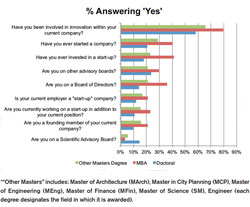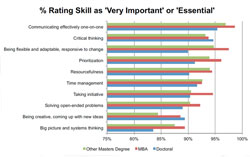
| Vol.
XXV No.
4 March / April 2013 |
| contents |
| Printable Version |
Survey of Graduate Alumni: Career Trajectories, Entrepreneurship, and Professional Skills
MIT alumni with graduate degrees currently total 79,885 and now constitute over 50% of all MIT alumni. Their accomplishments are diverse, numerous, and bring great prestige to MIT. Examples include 20 Nobel Prize winners (among them George Smoot PhD ’71, Physics; Kofi Annan SM ’72, Peace; and Paul Krugman PhD ’77, Economics) and 23 astronauts (including Col. Edwin E. "Buzz" Aldrin, Jr., ScD ’63, and Ronald E. McNair, PhD ’76). MIT has graduated leaders in fields as diverse as government (such as Benjamin Netanyahu SM ’76, Prime Minister of Israel, and Sheila Widnall SM ’61, ScD ’64, former Secretary of the Air Force 1993-1997, MIT Institute Professor of Aeronautics and Astronautics and Engineering Systems Division), online education (Salman Khan, MEng ’98, founder of the Khan Academy), music technology (Amar Bose SM ’52, ScD ’56, founder of Bose), computers (Radia Perlman SM ’76, PhD ’88, “Mother of the Internet,” and Steve Kirsch SM ’80, inventor of the optical mouse), business (Robin Chase SM ’86, founder of Zipcar, and Cecil H. Green SM ’24, founder, Texas Instruments), invention (Bernard Gordon SM ’49, inventor of Doppler Radar and holder of over 200 patents), and academia (Shirley A. Jackson, PhD ’73, President of Rensselaer Polytechnic Institute and nuclear physicist). Graduate alumni represent a rich source of information about the knowledge and skills gained during their education at MIT and its persistence throughout their career.
During the fall semester of 2012, the Office of the Dean for Graduate Education (ODGE) sponsored a survey of graduate alumni whose degrees were awarded approximately 5, 10, 15, 20, and 25 years prior. The purpose of the survey was to elucidate post-graduate trends in employment and career trajectories, entrepreneurship activities, professional activities and accomplishments, and the necessary knowledge and skillsets for various career paths.
We expect this information will be useful in the development of graduate curricula, co-curricular professional development activities, and strengthening engagement with graduate alumni. The graduate alumni survey yielded 3,692 valid responses, corresponding to an overall response rate of 23%. The distribution of respondents, both by cohort and by general field of study, is similar to that of the invited population. Doctoral students responded at a higher rate than other degree categories, but the majority of the conclusions we draw are within degree type. The proportion of female graduate alumni respondents increases by cohort year, from 18% of those 25 years out to 37% of those five years out. Similarly, the proportion of non-U.S. citizens increases by cohort year, with 16% of those 25 years out saying they are not a U.S. citizen to 40% of those five years out. The full survey results may be accessed at web.mit.edu/ir/surveys/grad_alum.html.
The dataset provides a wealth of information and is currently being analyzed. Of note, 94% of graduate alumni respondents were "generally satisfied" or "very satisfied" with their time being a graduate student at MIT. In what follows, we describe some salient Institute-level trends in the areas of career trajectories, entrepreneurship, and professional skills.
Career Trajectories
93% of our graduate alumni are employed, with just 2% currently seeking employment (others are engaged in such activities as travel and caring for family). The average annual salary of graduate alumni was reported to be $156,793; the median was $137,500. Graduate alumni, overall, were most likely to report working in a private for-profit organization (54%), in a U.S. four-year college or university (13%), or to be self-employed (9%). Figure 1 disaggregates these data by degree type and shows significant and interesting differences. Though the doctoral degree has traditionally been considered as a main pathway to academia, 54% of doctoral alumni reported that their employer was a governmental, industry, not-for-profit, or other organization, or were self-employed. This is somewhat higher than the 45% of PhD recipients who report a non-academic employer at graduation. Alumni were also asked to describe the course of their career so far with regard to their field; over half of doctoral alumni reported that they remained in the same field while two-thirds of MBA alumni and 58% of other Masters alumni have changed fields at least once. A Task Force on Graduate Student Professional Development (“TFPRO”) that I have assembled is currently considering various necessary skillsets (discussed later on in this article), both discipline-specific and transferable, and will provide recommendations for formulating a coherent set of graduate co-curricular professional development offerings that will better prepare our graduate students for the employment trends observed in these data.

(click on image to enlarge)
Entrepreneurship
With MIT situated in a dense external ecosystem of start-ups, entrepreneurship among our faculty and students has flourished on MIT’s campus, rising sharply over the last 10 to 15 years. Institute-wide, 28% of graduate alumni have started a company, 25% have invested in a start-up, and 15% indicate they are working on a start-up currently (see Figure 2 for data disaggregated by degree type). In Figure 2, we can see that even 21% of Doctoral alumni, and 29% of other Masters alumni, have also started a company; of those respondents, 24% of Doctorates and 19% of Masters say the company was based on their research at MIT. 28% of the Doctorates and 33% of the Masters (both MBA and other) had started their first company within five years of their MIT degree. Moreover, 41% of Doctoral alumni have at least one patent or invention, as do 12% of MBA alumni and 27% of other Masters alumni.

(click on image to enlarge)
Professional Skills
All graduate alumni survey respondents were asked to rate the importance of a variety of professional skills to their current work on a scale from Not Important to Essential. The most highly ranked skill for all three groups (Doctoral, MBA, and other Masters alumni) was communicating effectively one-on-one. All three groups also ranked prioritization very highly, but the other three skills in the top five varied somewhat by group: Doctoral alumni valued critical thinking, time management, and taking initiative; MBA alumni highly ranked being flexible and adaptable/responsive to change, taking initiative, and resourcefulness; and other Masters alumni emphasized being flexible and adaptable/responsive to change, resourcefulness, and critical thinking. As mentioned above, the TFPRO will draw on these data from the survey to further inform its recommendations for formulating a coherent set of ideal professional development offerings for MIT graduate students.

(click on image to enlarge)
The key results elucidated by the graduate alumni survey are important as we consider the future of residential graduate education. Our graduates are pursuing a diverse set of career paths and experiencing dynamic career trajectories. They are extensively engaged in innovation and entrepreneurship. And they have identified transferable skills, including one-on-one communication, prioritization, critical thinking, flexibility, and resourcefulness, as critical to their success.
MIT must think carefully about how to evolve graduate education in response to the picture that emerges from these findings, and in response to the external forces of globalization, the rapid development of online education, financial strain, and the generational changes of our students. I believe the most effective path forward in addressing these changes is a graduate education experience that integrates residential, virtual, and global experiences.
Linking discipline-specific academic rigor with innovative and enriching non-traditional learning activities that develop transferable skills, context, and character will enable our students to generate and apply new knowledge to effect positive and transformative change in the nation and world in the twenty-first century.
Acknowledgements
Heather Konar, Office of the Dean for Graduate Education, Communications Officer; Office of The Provost/Institutional Research; The ODGE Advisory Board; ODGE Management Team; Task Force on Graduate Student Professional Development; Graduate Officers and Administrators; Chancellor W. Eric Grimson.
| Back to top | |
| Send your comments |
| home this issue archives editorial board contact us faculty website |